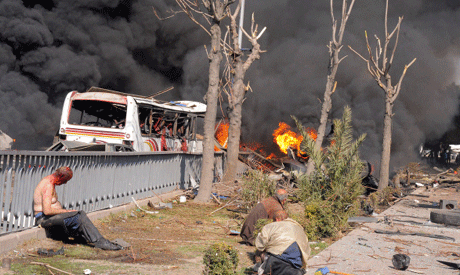
In this photo released by the Syrian official news agency SANA, injured Syrians sit on the ground while flames and smoke rise from burned cars after a huge explosion that shook central Damascus, Syria, Thursday, Feb. 21, 2013. (AP Photo/SANA)
A powerful car bomb exploded Thursday close to ruling party offices in Damascus, killing over 50 people and causing widespread destruction in the capital's deadliest attack since Syria's civil war erupted.
The bombing, blamed on "terrorists" by both the regime and its opponents, rocked the city centre and sent thick smoke scudding across the skyline, shortly before a mortar attack on a nearby military headquarters.
The attacks came as the opposition umbrella group, the National Coalition, was meeting in Cairo to discuss proposals to hold conditional talks with President Bashar al-Assad's regime.
Images of charred bodies lying next to mangled vehicles were aired on state television, which said children were among those wounded as the blast was near a school in the central district of Mazraa.
Sirens rang out and machinegun fire was heard as firemen rushed to the scene to douse the flames.
Police said the bomb exploded at 16 November Square near the ruling Baath party's head offices, and Russian news agencies reported the windows of Russia's embassy in Damascus were blown out, though none of its staff were hurt.
The Syrian Observatory for Human Rights said the blast killed 56 people, including 15 troops, and wounded more than 200, making it the deadliest bombing in Damascus since bombers first began targeting the capital about a year ago.
Previously, the deadliest explosion in Damascus was on May 10, 2012, when twin suicide bombings killed 55 people.
State media said the bombing, which left a large crater in a road, killed 53 people and wounded dozens.
There was no immediate claim of responsibility, but the official SANA news agency blamed "terrorists" -- the regime term for rebels who have been fighting to oust Assad for nearly two years.
"It is terrorism... Is that what you call Islam?" one of the wounded told Syrian television.
"Is that the freedom you want? Is that the (rebel) Free Syrian Army?" said another man, speaking at the site of the attack.
The opposition denounced as "terrorists" those behind the bombing.
"Any acts targeting civilians with murder or human rights violations are criminal acts that must be condemned, regardless of the perpetrator or the justification," the National Coalition said on Facebook.
The bombing was followed by a mortar attack on a military headquarters, state television and the Observatory reported without giving any information on casualties.
The Observatory also said two other car bombs exploded next to security posts in the north Damascus district of Barzeh, killing five soldiers among eight people.
The attacks come two days after two mortar shells exploded near Tishreen presidential palace in Damascus, increasingly targeted in the past year by suicide bombings, some claimed by the jihadist Al-Nusra Front.
They added urgency to the National Coalition meeting in Cairo, where discussions were centered on an offer by the opposition group's chief to hold direct talks with the regime.
"The agenda is long and among the issues to be discussed is the initiative of Ahmed Moaz al-Khatib," delegate Khaled Nasser told AFP.
Coalition chief Khatib has offered to talk to regime officials without "blood on their hands" -- an initiative welcomed by the Arab League and the United States as well as Assad allies Iran and Russia.
But the Syrian National Council, a key part of the Coalition, has rejected any talks until Assad quits, and the regime says it will only negotiate without pre-conditions.
UN-Arab League peace envoy Lakhdar Brahimi, who on Wednesday extended his mission by six months, has urged support for the plan, saying talks would "be a start to exiting the dark tunnel".
The UN says at least 70,000 people have been killed in the conflict, and the violence frequently spills across Syria's borders, spiking already-simmering regional tensions.
On Wednesday, the rebel Free Syrian Army threatened to hit back at Hezbollah, the powerful Lebanese militant group that backs Assad, unless it stops shelling FSA-held territory from across the border.
General Selim Idriss, the FSA chief of staff, told AFP the rebels were giving Hezbollah a 48-hour deadline to stop the attacks and "as soon as the ultimatum ends, we will start responding to the sources of fire".
Short link: